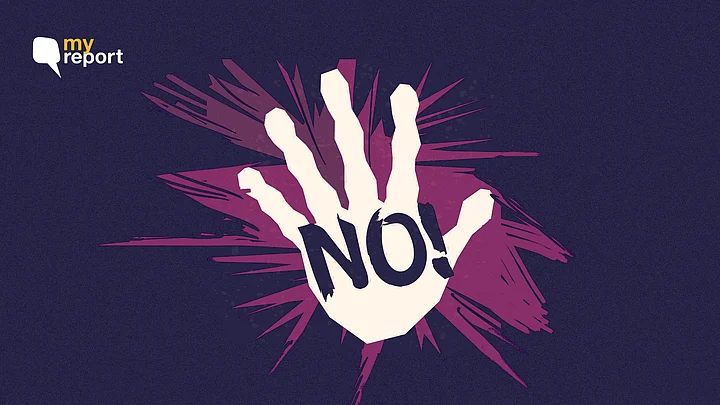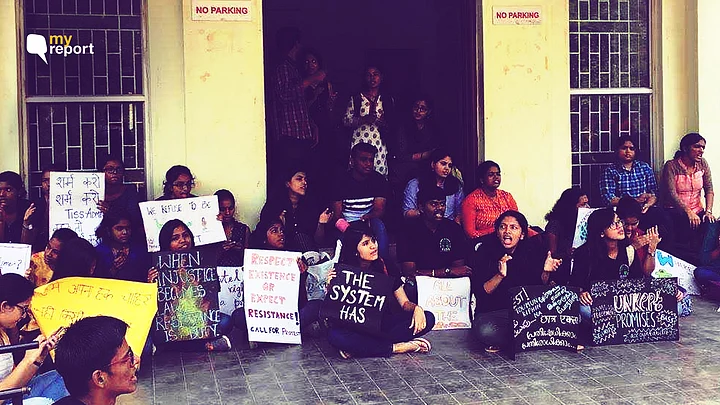In a vicious, unprovoked attack, our son, a student of Azim Premji University (APU) was brutally attacked, robbed and violated on the night of 14 January. The attack took place on a deserted stretch off Bikkanahalli Main Road leading from APU's UG2 hostel to Sarjapura Main Road in Bengaluru.
Having missed the university’s shuttle bus, 21-year-old Abhilash* (name changed) decided to walk the 2 km leafy, deserted road to join his friends for dinner at a nearby restaurant. It was only 6:35 pm, not an unearthly hour even by Bengaluru standards. Sarjapura police station stands just two kilometres away from the crime scene.
A few hundred yards from the hostel, he was waylaid by a trio who appeared to be under the influence of alcohol or narcotics. The trio set upon him and dragged him off the road into empty fields nearby.
He was easy prey; totally unprepared for such an encounter, having grown up in cantonments and gated communities all his life. They quickly relieved him of his OnePlus 6 smartphone, Motorola smartwatch and wallet. They didn’t even spare his shoes.
It would have been a simple robbery had it stopped at that. But they stripped him, burnt him with molten plastic and left him bound and gagged with his own partly-burnt jeans and belt. Abhilash recounts fearing for his life when one of the attackers picked up a boulder and threatened to smash his head in. He fell unconscious soon after.
It’s a phone call no parent ever wants to receive. Our initial shock, anger and disbelief slowly gave way to a sense of relief having got our boy back alive. Now we are left with the mental scars and a deep sense of betrayal.
That some miscreants could set upon a young man with impunity, just off Bengaluru’s elite IT corridor, to me, is symptomatic of the physical and moral squalor in which our cities are choking. There is something terribly wrong if we are able to shrug our shoulders and move on like it is business as usual.
While the police are investigating, we wish to share some key lessons from our ordeal, with the hope that others may learn and keep themselves safe.
The Police’s Response
The bitter irony that a police patrol van dropped the traumatised victim back on campus within an hour of the incident while doing nothing to cast an immediate dragnet for the perpetrators, is yet to sink in. This is 21st century policing in India. We understand the harsh realities under which they work. We were even thankful to the constable who dropped him, shared his mobile number and told him ‘feel free to call anytime’. In another country, law enforcement would have kicked in and moved with alacrity to close the gaps. Here, we let the culprits slip away on foot.
In the navy that I served for 23 years, there’s a phrase called ‘time late on datum’ used when hunting for enemy submarines. After initial contact, with each minute lost, the submarine probable area keeps expanding till it covers entire oceanic areas. Such basics must surely not be lost on the police.
A crime-spot survey was conducted over a week later. All the evidence was found still in place, bearing testimony to the brazenness of the crime and our laxity in dealing with them.
Empathy Towards Victims
What a victim in such scenario needs most is empathy – something almost completely missing from our hospitals and police stations. Doctors struggled with arcane paperwork and medico-legal procedures created in another era to ensure the victim spent a whole night at the hospital, battling injuries, sleep and bureaucracy.
The duty doctors – operating within the window of circadian low – did everything they could; but in the end, it is for the administration to set up processes that are patient and doctor-friendly. Presently, it mostly adds insult to injury.
Turning up almost completely without sleep at the police station the next morning, it took us over five hours to lodge a complaint, even with assistance from university authorities. Together with Abhilash, we had to relive the trauma over and over again just to avail our basic rights as law-abiding citizens, while the guilty roamed free on the streets outside. We are well-heeled citizens, fairly well connected and high-up in the social echelons. Spare a thought for the poor and defenceless. Surely, there is room for more grace in how we treat crime victims. Not every victim has a Twitter handle or followers on Facebook.
Freedom and Responsibility
With the freedom of youth comes the responsibility to keep ourselves and those under our charge safe from such incidents. The two are opposite sides of the same coin. Law and order must improve; nobody contests that.
But be mindful of the shocking police-to-citizen ratio, the long hours and abysmal conditions under which they work, abject lack of technology in policing, political interference, corruption and many other devils that conspire to deny common citizens the law enforcement they deserve. Then take responsibility for your own safety, knowing well that it is easier to be safe than be sorry.
Safety – A Collective Responsibility
Rapid urbanisation of Bengaluru, unequal distribution of wealth and deep-rooted corruption in governance and administration has left us in this abominable state. Sadly, it is the common man who pays the price. While we pad-up our children with modern amenities and accessories, we must also instil conventional wisdom to avoid setting up for incidents like this. This is not victim-shaming, just abundant precaution.
Don’t be fooled by the glitzy skyscrapers, 100-mbps HSDPs, flyovers, IT infrastructure and hyperbole of ‘Namma Bengaluru’. A few hundred metres off the highways, unbalanced growth and social inequities have created breeding ground for rowdies and violent crimes. On the fringes of the city, the dividing line between criminals and those whose duty it is to protect us may itself get blurred.
I recall the PSI from Sarjapura Police Station scolding the university officials the next day for setting up campus in such an ‘unsafe’ locality. Well, whose responsibility is it to ensure such safety?
Unfortunately for us, such thoughts came too late. The redoubtable Azim Premji will never bribe to get things done, we’re told. We respect that. Neither will we. Under the circumstances, some collateral damage is thus inevitable. We are prepared for that, have the university’s full cooperation, and justice will ultimately prevail.
Good Samaritans
What shines through all the gloom and apathy is the role played by good samaritans. The manager of a nearby building who lent Abhilash his jacket, summoned the police and sent him on his way, the resident mentors who received him on campus and provided succour and first aid, his friends who rallied behind him, the junior doctors who braved bureaucratic quagmire and multiple emergencies to diligently document all the injuries, random citizens, ‘old boys’ and police officials who offered help and support. But for them, the world would be such a poorer place. May your tribe grow.
Why Attacks Like These Continue
Three weeks on, the police have not even rounded up any suspects. Such muggings and attacks are on the rise as per Bengaluru police sources. Local newspapers and crime reporters will corroborate that. We provide world-class IT & BPO services to countries around the globe while basic facilities like streetlights and CCTVs are absent, allowing miscreants to break the law with impunity.
Abhilash is a military brat and has the chutzpah to move on with life. What is more poignant is that even in the darkest moments that night, he identified the issue for what it was: social inequities, corruption and a widening chasm between the haves and have-nots that unplanned urbanisation has brought to Bengaluru’s doorstep.
Hope that fact is not lost on our leaders. If our children cannot walk fearlessly on the streets at 6:30 pm, it is time to wake up and smell the decoction, Namma Bengaluru.
(*Name changed to protect the victim’s identity. An FIR has been lodged in the case. All 'My Report' branded stories are submitted by citizen journalists to The Quint. Though The Quint inquires into the claims/allegations from all parties before publishing, the report and the views expressed above are the citizen journalist's own. The Quint neither endorses, nor is responsible for them.)
(At The Quint, we question everything. Play an active role in shaping our journalism by becoming a member today.)





